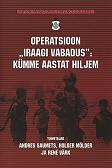OPERATSIOON "IRAAGI VABADUS": KAS RELVASTATUD JÕU KASUTAMISEKS OLI ÕIGUSLIK ALUS?
OPERATION IRAQI FREEDOM: WAS THERE A LEGAL BASIS FOR THE USE OF ARMED FORCE?
Author(s): René VärkSubject(s): Law, Constitution, Jurisprudence
Published by: Kaitseväe Ühendatud Õppeasutused
Keywords: use of armed force; self-defence; collective security; intervention; Iraq
Summary/Abstract: Since the 1980s, the international community has paid a great deal of attention to Iraq because its conduct has repeatedly threatened or breached international peace and security. International reaction has varied from condemnation (during the Iran-Iraq War in 1980s) to military action (when liberating Kuwait in 1991). A controversial phase began in 2002, when the United States and the United Kingdom argued that the international community should react more decisively and forcefully to address Iraq’s unwillingness to meet the obligations that had been imposed on it by the Security Council. First, they hoped that the Security Council would authorise the use of armed force, but this was seen as excessive by many countries, and authorisation was blocked. Then, together with Australia, they chose to act unilaterally and launched a military intervention on the 20th of March 2003. The allies invoked several justifications for their action (humanitarian intervention, an operation against terrorism, self-defence), but the principal basis was an implied authorisation from the Security Council. They posited the argument that when the Security Council’s Resolutions 678, 687 and 1441 were interpreted together, then Iraq’s continuing defi ance in 2003 revived the explicit authorisation that had been given in 1990. This argument is dubious for several reasons. Why should authorisation be revived 12 years later and in a different context? The original authorisation was given for the use of armed force in co-operation with the Kuwaiti Government to liberate Kuwait and consequently to restore peace and security to the region. Operation Iraqi Freedom, however, was conducted without the involvement of Kuwaiti Government and was initiated with the sole intent of restoring (supposedly threatened or breached) peace and security to the region. The aforementioned resolutions envisioned a decisive role for the Security Council (e.g. whether Iraq continues to defy its international obligations and how to subsequently react), but the allies took the liberty of making decisions unilaterally. The revival arguments rely on the presumption that authorisation was only suspended when the ceasefire was agreed to between Iraq and the coalition in April 1991. However, deliberations of the Security Council indicate that the countries had accepted that the cease-fi re ended the authorisation, and individual action by a coalition member was no longer a possibility. In conclusion, Operation Iraqi Freedom lacked a clear legal basis.
Journal: KVÜÕA toimetised
- Issue Year: 2014
- Issue No: 18
- Page Range: 71-95
- Page Count: 25
- Language: Estonian

